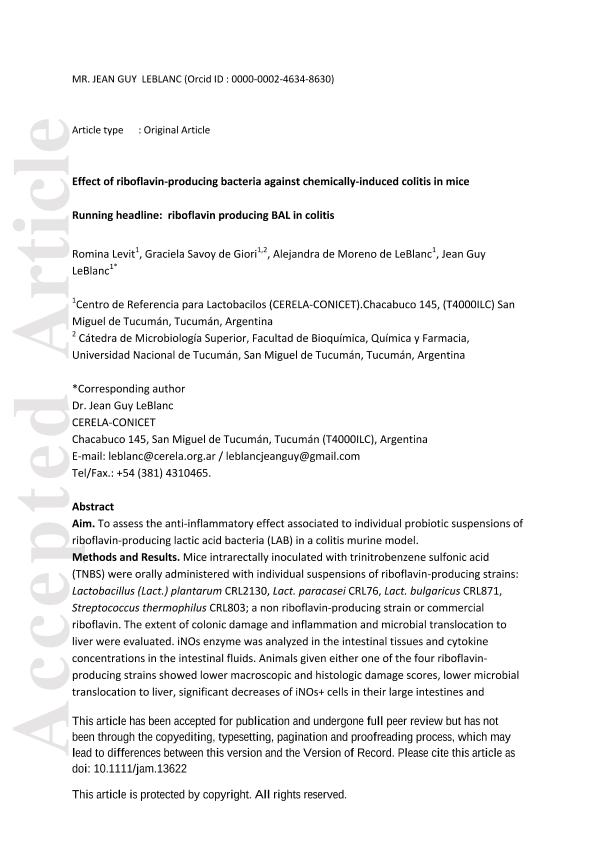Artículo
Effect of riboflavin-producing bacteria against chemically induced colitis in mice
Fecha de publicación:
10/2017
Editorial:
Wiley Blackwell Publishing, Inc
Revista:
Journal of Applied Microbiology
ISSN:
1364-5072
Idioma:
Inglés
Tipo de recurso:
Artículo publicado
Clasificación temática:
Resumen
Aim: To assess the anti-inflammatory effect associated with individual probiotic suspensions of riboflavin-producing lactic acid bacteria (LAB) in a colitis murine model. Methods and Results: Mice intrarectally inoculated with trinitrobenzene sulfonic acid (TNBS) were orally administered with individual suspensions of riboflavin-producing strains: Lactobacillus (Lact.) plantarum CRL2130, Lact. paracasei CRL76, Lact. bulgaricus CRL871 and Streptococcus thermophilus CRL803; and a nonriboflavin-producing strain or commercial riboflavin. The extent of colonic damage and inflammation and microbial translocation to liver were evaluated. iNOs enzyme was analysed in the intestinal tissues and cytokine concentrations in the intestinal fluids. Animals given either one of the four riboflavin-producing strains showed lower macroscopic and histologic damage scores, lower microbial translocation to liver, significant decreases of iNOs+ cells in their large intestines and decreased proinflammatory cytokines, compared with mice without treatment. The administration of pure riboflavin showed similar benefits. Lact. paracasei CRL76 accompanied its anti-inflammatory effect with increased IL-10 levels demonstrating other beneficial properties in addition to the vitamin production. Conclusion: Administration of riboflavin-producing strains prevented the intestinal damage induced by TNBS in mice. Significance and Impact of the Study: Riboflavin-producing phenotype in LAB represents a potent tool to select them for preventing/treating IBD.
Palabras clave:
Anti-Inflammatory Effect
,
Colitis
,
Lactic Acid Bacteria
,
Probiotic
,
Riboflavin
Archivos asociados
Licencia
Identificadores
Colecciones
Articulos(CERELA)
Articulos de CENTRO DE REFERENCIA PARA LACTOBACILOS (I)
Articulos de CENTRO DE REFERENCIA PARA LACTOBACILOS (I)
Citación
Levit, Romina; Savoy, Graciela; de Moreno, Maria Alejandra; Leblanc, Jean Guy Joseph; Effect of riboflavin-producing bacteria against chemically induced colitis in mice; Wiley Blackwell Publishing, Inc; Journal of Applied Microbiology; 124; 1; 10-2017; 232-240
Compartir
Altmétricas




